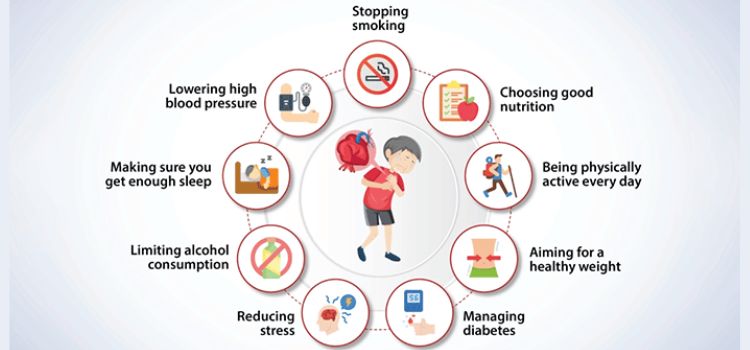
How can we prevent Heart Problems?
reventing heart problems is within your reach with proactive measures. Adopting a heart-healthy lifestyle through regular exercise, balanced nutrition, and maintaining a healthy weight is fundamental. Quitting smoking, limiting alcohol intake, and managing stress are additional keys to safeguarding your heart. Regular health check-ups to monitor blood pressure, cholesterol, and blood sugar levels enhance early detection and intervention.
1. Embrace a Heart-Healthy Lifestyle:
Engage in regular physical activity, such as brisk walking, jogging, or cycling. Aim for at least 150 minutes of moderate-intensity exercise per week.
2. Adopt a Balanced Diet:
Opt for a diet rich in fruits, vegetables, whole grains, and lean proteins. Minimize saturated fats, cholesterol, and sodium intake for better heart health.
3. Manage Your Weight:
Maintain a healthy weight through a combination of balanced nutrition and regular exercise. Shedding excess pounds reduces strain on your heart.
4. Quit Smoking:
Smoking is a major risk factor for heart disease. Quitting not only improves heart health but also benefits overall well-being.
5. Limit Alcohol Intake:
Moderate alcohol consumption is key. For men, this means up to two drinks per day, and for women, one drink per day. Excessive alcohol can contribute to heart problems.
6. Know Your Numbers:
Regularly monitor blood pressure, cholesterol levels, and blood sugar. Awareness empowers you to take control and manage risk factors effectively.
7. Stress Management:
Practice stress-reducing techniques like meditation, deep breathing, or yoga. Chronic stress can contribute to heart problems, so finding healthy coping mechanisms is crucial.
8. Stay Hydrated:
Proper hydration supports overall health, including heart function. Aim for at least eight glasses of water a day unless otherwise advised by your healthcare provider.
9. Quality Sleep Matters:
Prioritize a good night's sleep. Lack of sleep can contribute to heart issues, so aim for 7-9 hours of quality sleep each night.
10. Regular Health Check-ups:
Schedule regular check-ups with your healthcare provider. Early detection of risk factors allows for timely intervention and prevention of potential heart problems.